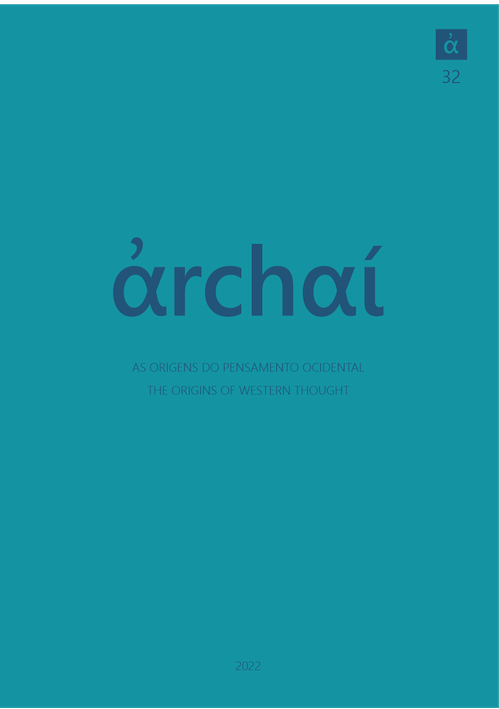Neoptolemus' indecision in Sophocles' Philoctetes. A philosophical reading
DOI:
https://doi.org/10.14195/1984-249X_32_09Keywords:
Philoctetes, Neoptolemus, indecision, practical impotence, willAbstract
Among the Sophoclean heroes, the figure that stands out is the one of Neoptolemus, in particular because of his difficulty when successfully delivering a course of an action. The young man assumes to carry out a ruse devised by Odysseus in order to obtain the infallible bow of Philoctetes, who has been living for ten years marooned in the deserted island of Lemnos. But once being close to his goal, he is suddenly seized by a doubt that prevents him from achieving such purpose, and therefore undermining his capacity as an agent. Neoptolemus eventually confesses to the lonely islander the dishonest motive for his presence, and, by excusing himself, claims to be governed by a"necessity"(v.923:ananke). This paper will firstly expose the context of development and characteristics of the plan devised by the ingenious king of Ithaca; and will secondly explain Neoptolemus' indecision based on the particular relationship between his discourse and the reality he pretends; moreover it will emphasize the ontological derivations of the central conflict of the play and, finally, it will enter in to the practical corollaries regarding the previous points.
Downloads
References
ALAMILLO, A. (2006) Sófocles, Tragedias (Traducción y notas). Madrid: Gredos.
BLUNDELL, M (1988: 137-148) The 'Phusis' of Neoptolemus in Sophocles' 'Philoctetes', Greece & Rome, Vol. 35, No. 2 Published by: Cambridge University Press on behalf of The Classical Association.
BLUNDELL, M. (1991) Helping Friends and Harming Enemies: A Study in Sophocles and Greek Ethics. Cambridge University Press.
CHAME, S. (2017). "La ontología negativa en las filosofías socráticas y sus proyecciones interepocales", Eidos, pp. 39-69.
GALLEGO, J. (2012), “La democracia ateniense en el desierto de Lemnos. El Filoctetes de Sófocles y la política del dêmos.”, en Lógos y Arkhé. Discurso politico y autoridad en la Grecia Antigua. Buenos Aires: Miño y Dávila, pp. 69-102
GOMEZ LOBO, A. (1994) La ética de Sócrates, Santiago de Chile: Editorial Andrés Bello.
HEIDEGGER, M. (2009) El ser y el tiempo. Trad. José Gaos. México: Fondo de Cultura Económica.
JEBB, R. C. (ed.) (1885), Sophocles, The Plays and Fragments, part I, The Oedipus Tyrannus, with Critical Notes, Commentary, and Translation in English prose, Cambridge, at the University Press.
JEBB, R. C. (ed.) (1885), Sophocles, The Plays and Fragments, part IV, The Philoctetes, with Critical
MÁRSICO, C. (2013) Filósofos socráticos. Testimonios y fragmentos I. Megáricos y cirenaicos. Buenos Aires: Losada.
NELLI, M.F. (2008) “Los conceptos de verdad y falsedad en Filoctetes de Sófocles”, Synthesis 15:95-106
NUSSBAUM, M. (1976) “Consequences and Character in Sophocles’ Philoctetes”, Philosophy and Literature 1: 25-53
NUSSBAUM, M. (2004) La fragilidad del bien. Fortuna y ética en la tragedia y la filosofía antigua. Madrid: A. Machado libros
LLOYD-JONES, H., WILSON, N. G. (eds.) (1990). Sófocles. Sophoclis fabulae. Oxford: Oxford University Press.
REINHARDT, K. ([1933] 2010.) Sófocles. Madrid: Editorial Gredos.
REHM, R. (2002) The Play of Space. Spatial Transformation in Greek Tragedy. Princeton.
SÁNCHEZ MADRID, N. (2014) “Acción y arrepentimiento en el Filoctetes de Sófocles.”, Devenires, xv, 29: pp. 13-39
SARAVIA, M.I. (2005/6) “Un discurso ineficaz en Neoptólemo?”, Circe de Clásicos y Modernos 10: 247 -60.
SEGAL, C. (1981) Tragedy and Civilization: An interpretation of Sophocles, Cambrige (Mass).
SEGAL, C. (1995) Sophocles’ Tragic World. Divinity, Nature, Society, Cambrige.
VERNANT, J.-P. (2002), “Esbozos de la voluntad en la tragedia griega”, en Mito y tragedia en la Grecia antigua, vol I, Madrid: Taurus.
VEGETTI, M., Tra Edipo e Euclide. Forme del sapere antico, Milano: Il Saggiatore, 1983
VIDAL NAQUET, P. (2002), “El Filoctetes de Sófocles y la efebía”, en Mito y tragedia en la Grecia antigua, vol. I, Madrid: Taurus.
Downloads
Published
How to Cite
Issue
Section
License
Copyright (c) 2022 Luciano Ciruzzi

This work is licensed under a Creative Commons Attribution 4.0 International License.
Given the public access policy of the journal, the use of the published texts is free, with the obligation of recognizing the original authorship and the first publication in this journal. The authors of the published contributions are entirely and exclusively responsible for their contents.
1. The authors authorize the publication of the article in this journal.
2. The authors guarantee that the contribution is original, and take full responsibility for its content in case of impugnation by third parties.
3. The authors guarantee that the contribution is not under evaluation in another journal.
4. The authors keep the copyright and convey to the journal the right of first publication, the work being licensed under a Creative Commons Attribution License-BY.
5. The authors are allowed and stimulated to publicize and distribute their work on-line after the publication in the journal.
6. The authors of the approved works authorize the journal to distribute their content, after publication, for reproduction in content indexes, virtual libraries and similars.
7. The editors reserve the right to make adjustments to the text and to adequate the article to the editorial rules of the journal.



